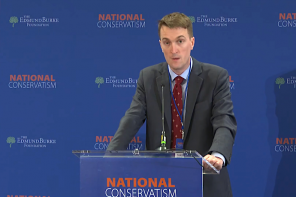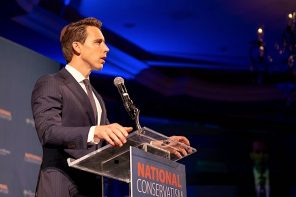Marco Rubio went on television with the Christian Broadcasting Network’s David Brody and suggested that Christianity is on the verge of being labeled “hate speech.”
If you’re scratching your head, you’re not alone.
Rubio’s rambling statement botched a simple understanding of constitutional law and free speech rights. Not to mention reality.
According to CBN’s transcript:
“If you think about it, we are at the water’s edge of the argument that mainstream Christian teaching is hate speech,” Rubio told CBN News. “Because today we’ve reached the point in our society where if you do not support same-sex marriage you are labeled a homophobe and a hater.”
“So what’s the next step after that?” he asked.
“After they are done going after individuals, the next step is to argue that the teachings of mainstream Christianity, the catechism of the Catholic Church is hate speech and there’s a real and present danger,” he warned.
Rubio appeared to be referring to the legal concept of “clear and present danger,” which the Supreme Court developed in the early 20th century, attempting to articulate the circumstances under which the government can proscribe political speech. Through the early 20th century the Court applied it in situations in which a person’s speech was deemed to be a threat to national security, sustaining a war effort, or to the stability of the government. But in the later part of the century, the Court abandoned it.
The Court last appeared to address this idea in 1969, in Brandenburg v. Ohio. In that case, it reversed the conviction of Clarence Brandenburg, a Ku Klux Klan leader, under an Ohio statute that criminalized “crime, sabotage, violence, or unlawful methods of terrorism as a means of accomplishing industrial or political reform” for a speech in which he said, “if our President, our Congress, our Supreme Court, continues to suppress the white, Caucasian race, it’s possible that there might have to be some revengeance taken.” The Ohio law, the Court held, violated Brandenburg’s free speech rights.
Although the Court’s opinion does not use the term “clear and present danger” and explicitly reject it, in his concurrence, Justice William O. Douglas noted his skepticism that it could be squared with the First Amendment at all. “Though I doubt if the ‘clear and present danger’ test is congenial to the First Amendment in time of a declared war,” he wrote, “I am certain it is not reconcilable with the First Amendment in days of peace.”
Returning to Rubio’s statement, he is vague about who is labeling Catholic teaching “hate speech.” Does he mean the government? Does he mean people on the internet? Under the First Amendment, the government cannot stop citizens from engaging in speech, even if a listener finds it hateful. If by “they” he means American citizens, the simple answer is “they” have a constitutionally protected right to criticize the Catholic church; the church also has a constitutionally protected right to its doctrine.
But if Rubio is suggesting that “they” are the government, I can’t begin to wrap my mind around the scenario he is suggesting. Is he suggesting the government will deem a church’s teaching “hate speech?” There’s no basis or precedent that would remotely suggest that the government could regulate religious speech (whether “mainstream Christian teaching” or other religious teaching) at all, much less deeming it “hate speech.” The Free Exercise Clause protects religious practice and religious speech. Under the Free Speech Clause, the government cannot proscribe “hate speech” or even define it. Under the Establishment Clause, the government cannot endorse (or renounce) a particular religion.
You can say gay people are intrinsically disordered. Or you can say they don’t have a constitutional right to get married. They can say you’re a homophobe. The government can’t stop any of you.
But Rubio blurs the issue by suggesting that a nebulous “they” will first “go[] after individuals,” after which there is a slippery slope to arguing that “the catechism of the Catholic Church is hate speech.” Although CBN transcribed his next words as “and there’s a real and present danger,” if you watch the video, he says, “and that’s a real and present danger.” Suggesting, therefore, not that he believes “they” will argue that Catholic teaching is a “real and present danger” (whatever that is) but that the nebulous “they” present a “real and present danger” to Christianity.
Rubio’s statement is simply a confused muddle of fear-mongering and constitutional misconception. Neither of which is very presidential.




